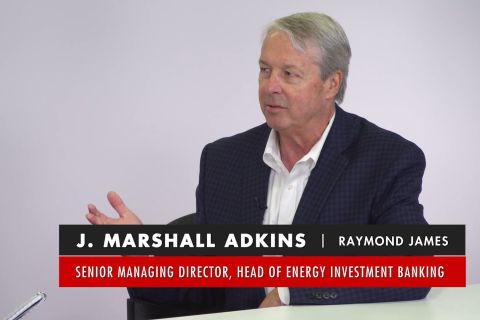
"It's kind of on the tip of people's tongues. We've got aggressive regulators. They're investigating some transactions more deeply than I think we would've expected them to before," Chuck Boyars, antitrust and competition attorney with Kirkland & Ellis. told Hart Energy's Nissa Darbonne at SUPER DUG Conference & Expo in Fort Worth, Texas.
Considering the current Federal Trade Commission’s heightened scrutiny of oil and gas M&A and other deals, Exxon Mobil and Pioneer Natural Resources were likely “very happy” to get merger clearance, according to an antitrust attorney.
The FTC allowed the deal to go forward with only one condition: Ban Pioneer’s founding CEO, Scott Sheffield, from participating in the combined company’s decision-making going forward, according to Chuck Boyars, antitrust and competition attorney with Kirkland & Ellis.
Under the initial merger agreement, Sheffield was to hold a position on the Exxon Mobil board representing former Pioneer shareholders.
“The current administration is very negative towards what they call ‘remedies,’” Boyars told attendees at Hart Energy’s SUPER DUG 2024 Conference & Expo in Fort Worth.
Remedies to winning FTC approval can include a sale of some assets. “[These] used to be extremely common, extremely accepted,” Boyars said. “Current regulators are deeply against [this].”
But the FTC has changed its approach.
The commission alleged that Sheffield communicated with U.S. and global producers in the past about reining in global oil gluts.
In the merger, Exxon Mobil gained Pioneer’s 721,000 boe/d of Midland Basin production plus future-well inventory, bringing its Permian Basin production to an average 1.3 MMboe/d. It expects this to grow to 2 MMboe/d in 2027.
‘Quite quick’
Boyars wasn’t an adviser to either party in the merger.
“But from the outside, my perception is that those parties were probably very happy with that because they got to a closing,” he said. “[It was] seven months after signing, which is quite quick in the scheme of [an FTC review].”
The merger agreement between Exxon and Permian Basin producer Pioneer was announced on Oct. 11. The FTC issued approval with the one condition on May 2. The merger closed the following day.

“And they walked away with a remedy where they didn't sell a single asset or they didn't accept … material restrictions on their business going forward.”
Exxon Mobil agreed to do some compliance reporting involving the one condition “and to comply with the law, which is a pretty reasonable thing to do,” he said.
“Needless to say, there was some impact on Scott Sheffield as an individual … but I think the go-forward company is very happy with that outcome.”
The FTC review and decision could have taken up to 11 months or “even more,” he said.
“And again, remedies are not so common these days. So being done—with a limited remedy—in seven months” is a win.
Sheffield planned to retire
Sheffield had intended to retire from Pioneer in 2016. Tim Dove, the company’s COO, took the CEO post that year-end and Sheffield became executive chairman with a plan of exiting that post at year-end 2017 and holding only a non-executive board role.
The board asked Sheffield to return to the CEO post, though, in 2019.
Prior to the October deal announcement, the company’s plan was that Rich Dealy, who was president and COO, would become CEO this Jan. 1 and Sheffield would act only as a non-executive board member. Dealy became CEO and Sheffield took the post of special adviser to the CEO.
“It’s a tough FTC and [Department of Justice] environment,” Boyers said. “I think it's an area that's gotten a lot of attention from the Biden administration.
“… It's kind of on the tip of people's tongues. We've got aggressive regulators. They're investigating some transactions more deeply than I think we would've expected them to before.
“They're investigating certain theories of harm … compared to traditional antitrust principles.”
One sign that there is a new FTC is that chairman Lina Khan appeared in a Comedy Central talk show recently, “which is something that [we] kind of never would've expected to see in the antitrust world.”
The 2022 matter
Until the FTC blocked XCL Resources from gaining EP Energy assets in the Uinta Basin in 2022, an E&P deal had not been blocked since one involving Alaska’s North Slope in 2000. In the interim, the FTC had acted in midstream and gas-station deals.
In the Uinta matter, refiners that are tooled to handle the basin’s waxy crude said too much supply would be held by one operator.
The FTC prohibition was a surprise to the industry. “Maybe the lesson is to [not] assume that past practice guarantees future performance and take each deal on its merit,” Boyars said.
Four more deals
The FTC’s continued scrutiny of four oil and gas deals isn’t very surprising, though, Boyars, considering the deals’ sizes and the property involved. These include Chesapeake Energy’s merger with Southwestern Energy. The $7.4 billion deal would create a new No. 1 U.S. gas producer with net production of 7.9 Bcf/d.
These are “transactions of a magnitude in nature that sets them apart. … It's only in that much larger end of the spectrum that we really see things playing out differently in terms of agency interest and reaction,” Boyars said.
Could FTC scrutiny of oil and gas deals be part of Biden’s anti-carbon agenda, aiming to reduce American oil and gas supply by not allowing operators to become more efficient?
“Some have suggested that,” Boyars said.
“I'll say that I personally haven't seen evidence for it. … We haven't seen any indication that there are currents like that running below the surface.”
Recommended Reading
Howard: Power Generation Growth Dependent on NatGas Demand
2024-06-13 - Electricity demand needs reliable natural gas to function as coal capacity is retired and less reliable renewables take a greater share of the power supply stack.
US LNG to Asia Has Lower Emissions Profile than Coal, Rystad Says
2024-06-12 - LNG emissions are up to 50% lower on average than for coal-fired power generation, even when the fuel is shipped over long distances, according to new research from Rystad Energy.
Exclusive: Adkins on Challenged Gas Prices, Growing Crude Demand
2024-05-15 - J. Marshall Adkins, head of energy investment banking at Raymond James, details the future of natural gas prices and misconceptions about crude demand coming to an end in this Hart Energy Exclusive interview.
US Natgas Prices Hit 5-week High on Rising Feedgas to Freeport LNG, Output Drop
2024-04-10 - U.S. natural gas futures climbed to a five-week high on April 10 on an increase in feedgas to the Freeport LNG export plant and a drop in output as pipeline maintenance trapped gas in Texas.
Wars Complicate Energy Transition Despite US LNG Security Blanket
2024-06-10 - Analysts with Norway’s Equinor argue that increased levels of geopolitical conflict and outright wars “have made the energy transition more fragmented,” despite U.S. LNG creating an energy security blanket for Europe and elsewhere.





